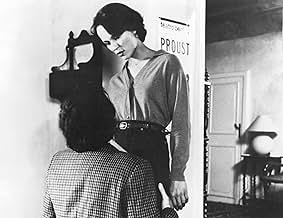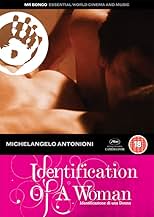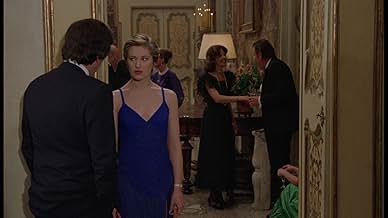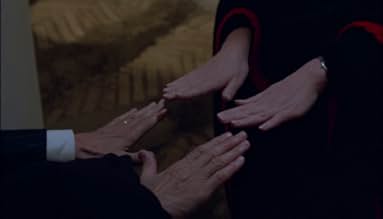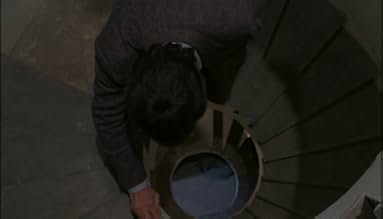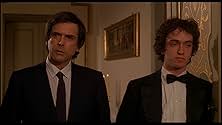VALUTAZIONE IMDb
6,6/10
3460
LA TUA VALUTAZIONE
Niccolò, regista alla ricerca di un personaggio femminile e di una storia, ha due rapporti successivi con due giovani donne, l'aristocratica Mavi e la borghese Ida. Ne esce due volte sconfit... Leggi tuttoNiccolò, regista alla ricerca di un personaggio femminile e di una storia, ha due rapporti successivi con due giovani donne, l'aristocratica Mavi e la borghese Ida. Ne esce due volte sconfitto.Niccolò, regista alla ricerca di un personaggio femminile e di una storia, ha due rapporti successivi con due giovani donne, l'aristocratica Mavi e la borghese Ida. Ne esce due volte sconfitto.
- Regia
- Sceneggiatura
- Star
- Premi
- 1 vittoria e 5 candidature totali
Enrica Antonioni
- Nadia
- (as Enrica Fico)
Giampaolo Saccarola
- The Gorilla
- (as Gianpaolo Saccarola)
Dado Ruspoli
- Mavi's Father
- (as Alessandro Ruspoli)
Pier Francesco Aiello
- Young Man at Party
- (as Pierfrancesco Aiello)
Carlos Alberto Valles
- Close-Up Man
- (as Carlos Valles)
Recensioni in evidenza
Possibly the most atmospheric film I ever seen, it made a huge impact when I first saw it, and that opinion has never changed. If there is one film that conveys the mystery of life this is it. It is also a highly evocative picture of Italy from the perspective of the upper middle classes in the late Seventies. Crying out for a DVD release as the photography was excellent too on the original film showings.
Antonioni's last film prior to his suffering a stroke is this very typical effort (co-written with Gerard Brach and Tonino Guerra), dealing with a number of key themes that run through his work – lack of communication, the mystery-as-journey-of-self-discovery, etc. That said, the film wasn't picked up for U.S. release until 1996 and is consequently perhaps the least-seen of Antonioni's films from his post-AVVENTURA phase!
Anyway, the mystery element links the film with the director's earlier BLOW UP (1966) and THE PASSENGER (1975); still, it's never as intriguing here as in those more celebrated titles (especially since, for once, it's explained away at the end!) but, as I said, the film eventually emerges to be more about the mid-life crisis of its central character (despite the title). Interestingly, he's a film director – though "Euro-Cult" favorite Tomas Milian feels as incongruous to Antonioni's cinema as Marcello Mastroianni's presence had been in LA NOTTE (1961)! He has an obsessive relationship with a young woman (even enjoying some LAST TANGO IN Paris [1972]-type sex scenes!) who eventually leaves him and disappears (shades also of L'AVVENTURA [1960]); while searching for her, he meets a variety of other willing girls (among them Antonioni's own future wife Enrica Fico). Marcel Bozzuffi appears in one brief, irrelevant scene as Milian's brother.
Overall, the film is tiresomely long and often mirrors the tedium experienced by the characters; the ending, however, is a beauty – suggesting that, even if he's a failure at love, a film director is still left with his imagination. Carlo Di Palma's cinematography is notable, too – particularly at the Venice location (where, coincidentally, I saw the Antonionis three years ago!) and during the tense fog-bound sequence; the film's score, then, is a mix of electronic, ambient and pop – and all very much of its period. As was the case with THE PASSENGER, THE MYSTERY OF OBERWALD (which is now one of only two features by the director I've yet to catch up with!) and BEYOND THE CLOUDS (1995), Antonioni had a hand in the editing of the film; here, he receives sole credit for this and the result makes especially effective use of ellipses (the factors of time and space had always been a primary concern in his work – thus making the apparently mocking recourse to science-fiction at the end anything but coincidental!).
Anyway, the mystery element links the film with the director's earlier BLOW UP (1966) and THE PASSENGER (1975); still, it's never as intriguing here as in those more celebrated titles (especially since, for once, it's explained away at the end!) but, as I said, the film eventually emerges to be more about the mid-life crisis of its central character (despite the title). Interestingly, he's a film director – though "Euro-Cult" favorite Tomas Milian feels as incongruous to Antonioni's cinema as Marcello Mastroianni's presence had been in LA NOTTE (1961)! He has an obsessive relationship with a young woman (even enjoying some LAST TANGO IN Paris [1972]-type sex scenes!) who eventually leaves him and disappears (shades also of L'AVVENTURA [1960]); while searching for her, he meets a variety of other willing girls (among them Antonioni's own future wife Enrica Fico). Marcel Bozzuffi appears in one brief, irrelevant scene as Milian's brother.
Overall, the film is tiresomely long and often mirrors the tedium experienced by the characters; the ending, however, is a beauty – suggesting that, even if he's a failure at love, a film director is still left with his imagination. Carlo Di Palma's cinematography is notable, too – particularly at the Venice location (where, coincidentally, I saw the Antonionis three years ago!) and during the tense fog-bound sequence; the film's score, then, is a mix of electronic, ambient and pop – and all very much of its period. As was the case with THE PASSENGER, THE MYSTERY OF OBERWALD (which is now one of only two features by the director I've yet to catch up with!) and BEYOND THE CLOUDS (1995), Antonioni had a hand in the editing of the film; here, he receives sole credit for this and the result makes especially effective use of ellipses (the factors of time and space had always been a primary concern in his work – thus making the apparently mocking recourse to science-fiction at the end anything but coincidental!).
This is probably obvious, but if you don't like Antonioni, stay away from Identification of a Woman. If you've never seen another, check out one of these films first: L'Avventura, La Notte, L'Eclisse, Red Desert, Blowup, The Passenger, or Zabriskie Point. If you are a fan of Antonioni, like myself, please do check out this film. It is definitely one of Antonioni's weaker films, but it is still undeniably in his style and containing his regular themes. This one is about a film director who can be said to fall in love with a woman (who, incidentally, looks a lot like a very young and extraordinarily thin version of Monica Vitti), but he can't express that love. The woman is upset at this and disappears. In some ways, this is like a weaker version of L'Avventura. The man tries to get on with his life, begins dating again, but eventually realizes that his mind revolves around the girl who abandoned him. This film is disappointing, especially if you're in love with Antonioni the director. The direction is generally flat. Only a few scenes show his supreme visual style. 6/10.
Antonioni's "The Passenger" is probably my favorite film. It's a singular work which manages to have the highest philosophical ambitions without seeming the least pretentious. That's not to say that Antonioni never seems pretentious. He sometimes is very much so, and this is a case in point. I wouldn't describe this as a good movie exactly- it's a bit too self-absorbed, with some lousy dialog and a howlingly funny leading man, who seems like an SNL parody of an Italian leading man. But having said that, it's still vintage Antonioni, and he was a master. For every moment that makes a fan wince, there are others of exceptional compositional beauty: street scenes in which "extras" take on inarticulable metaphysical weight, moments, such as a scene where the protagonist is lost in fog, that seem to depict the invisible. The theme of the film could seem misogynistic, and in a way it is. But really, this film is about the unknowability of the Other, and the way that black hole nonetheless illuminates Being.
10Xanadu-2
A very beautiful film with that special Antonioni atmosphere. I can identify with the feeling of emptiness and the people who can´t really communicate with each other. Modern life and adulthood seems shallow and a bit soulless. You have to fill it with something and make it human again.
The first time I saw it I was disapointed but it improved greatly with the second viewing and I want to see it again. There are new things to discover each time as with all of Antonionis´ films.
The first time I saw it I was disapointed but it improved greatly with the second viewing and I want to see it again. There are new things to discover each time as with all of Antonionis´ films.
Lo sapevi?
- QuizThe last feature film Michelangelo Antonioni made before his debilitating stroke.
- ConnessioniFeatured in Tonino Guerra: Il poeta del cinema (2008)
- Colonne sonoreThe Fire Inside
Written by Steve Hillage and Monique Giraudy (as Miquette Giraudy)
Performed by Steve Hillage
Published by Virgin Music Publishers
I più visti
Accedi per valutare e creare un elenco di titoli salvati per ottenere consigli personalizzati
- How long is Identification of a Woman?Powered by Alexa
Dettagli
Botteghino
- Lordo in tutto il mondo
- 1605 USD
Contribuisci a questa pagina
Suggerisci una modifica o aggiungi i contenuti mancanti

